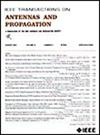Low-Frequency Stabilizations of the PMCHWT Equation for Dielectric and Conductive Media: On a Full-Wave Alternative to Eddy-Current Solvers
IF 5.8
1区 计算机科学
Q1 ENGINEERING, ELECTRICAL & ELECTRONIC
引用次数: 0
Abstract
We propose here a novel stabilization strategy for the Poggio–Miller–Chang–Harrington–Wu–Tsai (PMCHWT) equation that cures its frequency- and conductivity-related instabilities and is obtained by leveraging quasi-Helmholtz projectors. The resulting formulation is well-conditioned in the entire low-frequency regime, including the eddy-current one, and can be applied to arbitrarily penetrable materials, ranging from dielectric to conductive ones. In addition, by choosing the rescaling coefficients of the quasi-Helmholtz components appropriately, we prevent the typical loss of accuracy occurring at low frequency in the presence of inductive and capacitive type magnetic frill excitations, commonly used in circuit modeling to impose a potential difference. Finally, because it relies on quasi-Helmholtz projectors instead of the standard loop-star decomposition, our formulation can be used for modeling multiply connected geometries, without incurring the computational overhead caused by the search for the global loops of the structure, while also being compatible with most fast solvers. The efficacy of the proposed preconditioning scheme when applied to both simply and multiply connected geometries is corroborated by numerical examples.电介质和导电介质PMCHWT方程的低频稳定性:用全波替代涡流求解器
本文提出了一种新的稳定策略,用于Poggio-Miller-Chang-Harrington-Wu-Tsai (PMCHWT)方程,该策略可以消除与频率和电导率相关的不稳定性,并利用准亥姆霍兹投影仪获得。所得到的公式在包括涡流在内的整个低频范围内条件良好,并且可以应用于从介电到导电的任意可穿透材料。此外,通过适当地选择准亥姆霍兹分量的重标系数,我们防止了在电感和电容型磁冗余激励存在的低频下发生的典型精度损失,通常用于电路建模以施加电位差。最后,因为它依赖于准亥姆霍兹投影仪而不是标准的环星分解,我们的公式可以用于建模多重连接的几何形状,而不会产生由搜索结构的全局环引起的计算开销,同时也与大多数快速求解器兼容。通过数值算例验证了所提出的预处理方案在单连通和多连通几何上的有效性。
本文章由计算机程序翻译,如有差异,请以英文原文为准。
求助全文
约1分钟内获得全文
求助全文
来源期刊
CiteScore
10.40
自引率
28.10%
发文量
968
审稿时长
4.7 months
期刊介绍:
IEEE Transactions on Antennas and Propagation includes theoretical and experimental advances in antennas, including design and development, and in the propagation of electromagnetic waves, including scattering, diffraction, and interaction with continuous media; and applications pertaining to antennas and propagation, such as remote sensing, applied optics, and millimeter and submillimeter wave techniques

 求助内容:
求助内容: 应助结果提醒方式:
应助结果提醒方式:


